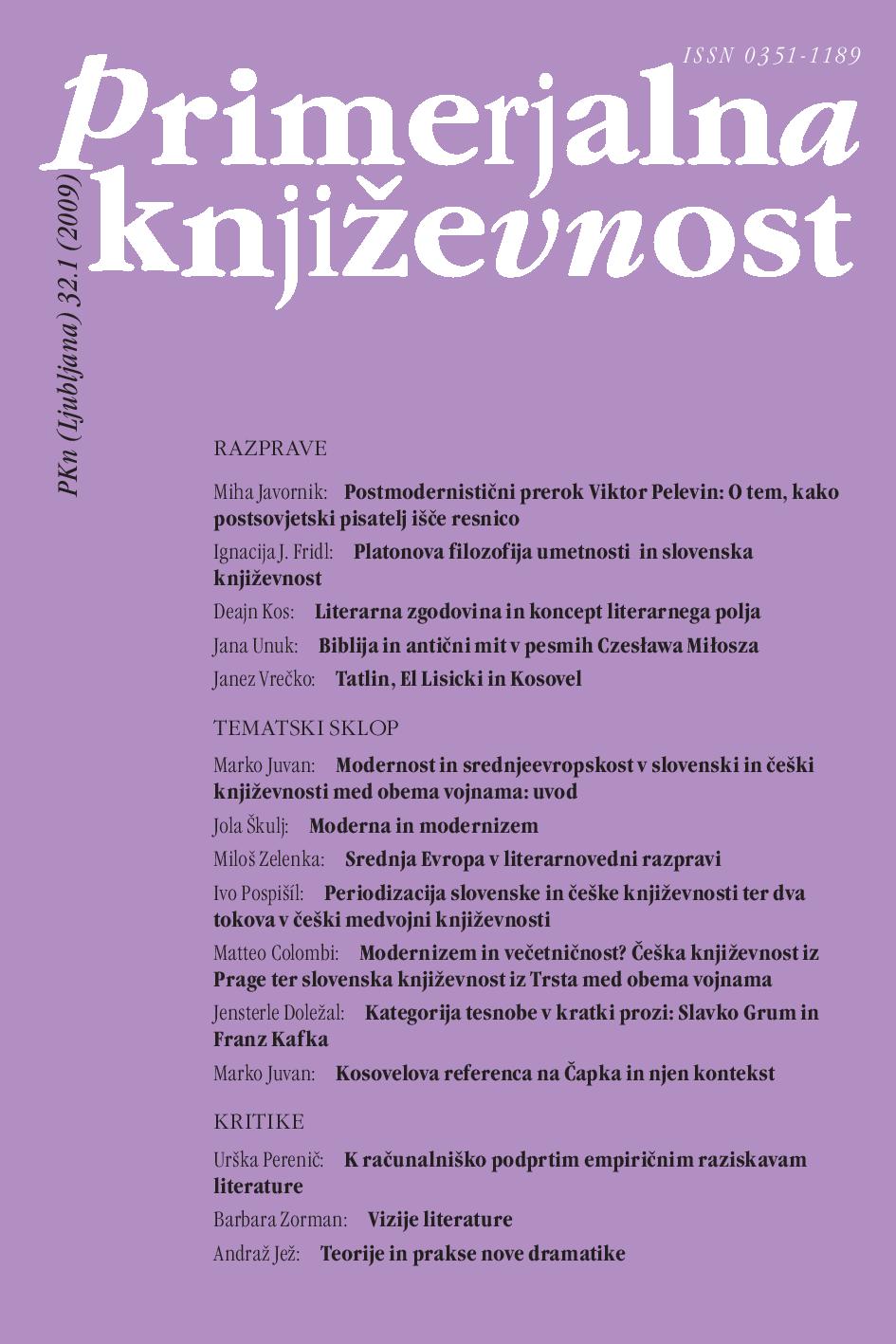Kosovel’s Reference to Čapek and Its Context
Keywords:
Slovene literature, Czech literature, intertextuality, interdiscursivity, modernism, anti-utopia, social engagement, Kosovel, Srečko, Čapek, KarelAbstract
Kosovel’s 1925 poetic montage “Kons” contains a series of references to Karel Čapek’s dystopian science-fiction play RUR of 1920, which was printed in Ljubljana in 1921 and then staged in 1922. During the interwar period, Čapek was the most widely translated and cited contemporary Czech writer in Slovenia; he was also interesting because he made his way into the world literature system and also because of his “global” perspective on the complex issues of the modern age. The reference to and concise paraphrase of Čapek’s play RUR, in which the concept of the robot was first introduced, can be seen as a modernist intertextual example for Kosovel’s engaged cosmopolitan treatment of a complex discursive problematics. In this discursive constellation, the metaphysic tradition of the modern rational and instrumental attitude towards the world and otherness (inscribed in the development of the motif of an artificial human or homunculus), substantiated by power, is historically realized in the form of social and political conflicts of globalized industrial capitalism; these conflicts are summed up in the Taylorist concept of production, which reduced the working class to a mechanism due to its logic of maximizing capital. After the First World War, the conflicts inherent in western modernity and capitalism gave rise to mass revolutionary movements and totalitarian regimes that brought European civilization to the verge of ruin. Čapek’s and Kosovel’s humanism was able to perceive and express this in many texts that were similar in terms of their hybrid, eclectic version of modernism, cosmopolitan view, and intertextual poetics.References
Borko, Božidar. »Literarni profil Karla Čapka«. Ljubljanski zvon 52 (1937): 145–151.
Bojtár, Endre. »The Avant-Garde in East-Central European Literature«. History of the Literary Cultures of East-Central Europe: Junctures and Disjunctures in the 19th and 20th Centuries. 1. Ur. Marcel Cornis-Pope in John Neubauer. Amsterdam in Philadephia: John Benjamins, 2004. 364–373.
Buriánek, František. Karel Čapek. Praga: Melantrich, 1978.
Casanova, Pascale. La République mondiale des Lettres. Pariz: Ed. du Seuil, 1999.
Čapek, Karel. Krakatit: roman. Prev. Ferdo Kozak. Ljubljana: Umetniška propaganda, 1929.
– – –. Pogovor s T. G. Masarykom. Prev. Janko Orožen. Ljubljana: Tiskarna Merkur, 1937.
– – –. R. U. R.: Rossum’s Universal Robots: kolektivna drama v treh dejanjih s predigro. Prev. Osip Šest. Ljubljana: Zvezna tiskarna, 1921.
– – –. Vojna s salamandri. Prev. Zdenka Škerlj Jerman. Ljubljana: Cankarjeva založba, 1974.
– – –. Zakaj nisem komunist. Ljubljana, 1944.
Daemmrich, Horst S. in Ingrid G. Themen und Motive in der Literatur. 2. izd. Tübingen in Basel: Francke, 1995.
Frenzel, Elizabeth. Motive der Weltliteraur. 1. izd. Stuttgart: Kröner, 1976.
– – –. Stoffe der Weltliteratur. 10. izd. Stuttgart: Kröner, 2005.
Jary, David in Julia. Collins Dictionary of Sociology. Glasgow: Harper Collins, 1991.
»Karel Čapek«. Wikipedia: The Free Encyclopedia. 25. maj 2009. http://en.wikipedia.org/wiki/Karel_%C4%8Capek [dostop 28. 5. 2009].
Klíma, Ivan. Velký věk chce mít též velké mordy: Život a dílo Karla Čapka. Praga: Academia, 2001.
Kosovel, Srečko. »Kons«. Zbrano delo 2. Ur. Anton Ocvirk. Ljubljana: DZS, 1974. 33.
– – –. »Mehanikom«. Zbrano delo 3/1. Ur. Anton Ocvirk. Ljubljana: DZS, 1977. 113–114.
Krasztev, Péter. »From Modernization to Modernist Culture«. History of the Literary Cultures of East-Central Europe: Junctures and Disjunctures in the 19th and 20th Centuries. 1. Ur. Marcel Cornis-Pope in John Neubauer. Amsterdam in Philadeplihia: John Benjamins, 2004. 332–348.
Lehár, Jan idr. Česká literatura od počátků k dnešku. Praga: Nakladatelství Lidové noviny, 1998.
Moldanová, Dobrava. Česká literatura období avantgardy: 1918–1945. Ústí nad Labem: Univerzita J. E. Purkyně, 2002.
Ocvirk, Anton. »Opombe«. S. Kosovel. Zbrano delo 2. Ur. A. Ocvirk. Ljubljana: DZS, 1974. 553–718.
– – –. »Opombe«. S. Kosovel. Zbrano delo 3/2. Ur. A. Ocvirk. Ljubljana: DZS, 1977.
»R.U.R.«. Wikipedia: The Free Encyclopedia. 19. maj 2009. https://en.wikipedia.org/wiki/R.U.R. [dostop 28. 5. 2009].
Steiner, Peter. The Deserts of Bohemia: Czech Fiction and Its Social Context. Ithaca: Cornell University Press, 2000.
Strohsová, Eva. »Karel Čapek«. Dějiny české literatury IV: Literatura od konce 19. století do roku 1945. Ur. Jan Mukařovský idr. Praga: Victoria publishing, 1995. 586–605.
Šest, Osip. »Karel Čapek: R. U. R. « Gledališki list. Ljubljana: Udruženje gledaliških igralcev, Mestni odbor Ljubljane, 1922–23.
van Rinsum, Annemarie in Wolfgang. Lexikon literarischer Gestalten. 2. izd. Stuttgart: Kröner, 1993.
Urbančič, Boris. Slovensko-češki kulturni stiki. Ljubljana: Mladika, 1993.
Zourabichvili, François. Le vocabulaire de Deleuze. Pariz: Ellipses, 2003.


